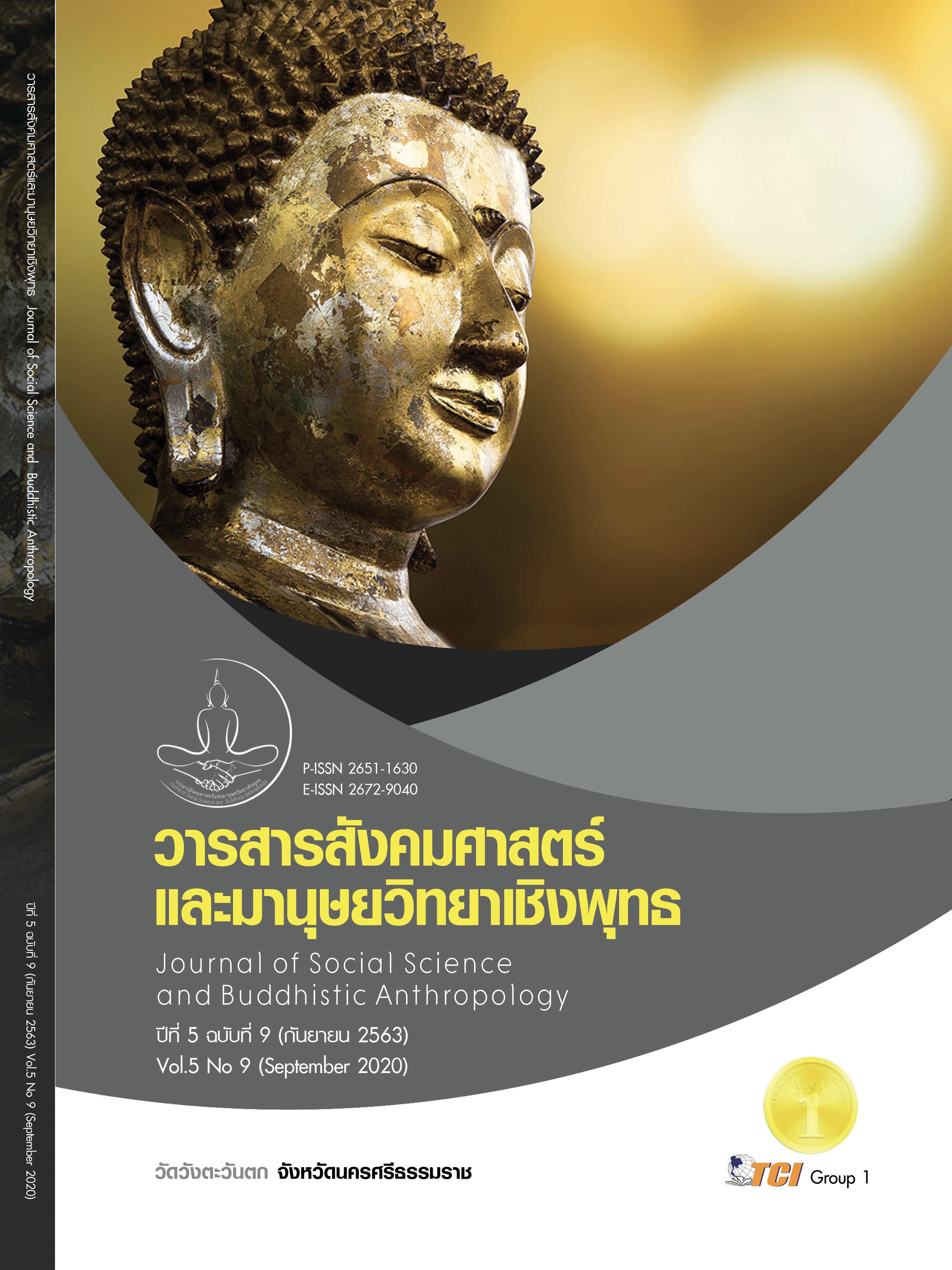THE DEVELOPMENT OF SUPERVISION MODEL TO ENHANCE TEACHERS COMPETENCY ON EDUCATIONAL QUALITY ASSURANCE
Keywords:
Supervisor model, Enhanced teacher competency, Educatinal quality assuranceAbstract
This research aimed 1) to study the factors of the competence of educational quality assurance 2) to develop models for educational supervision to enhance the educational quality assurance and 3) to study the effectiveness of models for educational supervision. The research tools for data collection were interview of academic experts; assessment of models for educational supervision to enhance the educational quality assurance and a questionnaire on the satisfaction of teachers towards the models of educational supervision. There were 5 experts, 9 academic experts and 81 teachers who gave information for this research. Regarding the result of this research, it was found that there were 3 factors of the competence of educational quality assurance: 1) understanding about educational quality assurance; 2) skills and abilities to analyze and implement educational quality development plan of school and also do performance report and individual self-assessment report; and 3) attitude towards educational quality assurance. With respect to models for educational supervision to enhance the educational quality assurance. The characteristics and process for educational supervision were composed of: 1) study the problems and need analysis; 2) functional planning; 3) enhancing process of practices; 4) performance; 5) friendly educational supervision; 6) knowledge and experience sharing; 7) feedback of educational supervision; and 8) elaboration. When compared understanding, skills and attitude about educational quality assurance of teachers before and after implementing the models for educational supervision to enhance the educational quality assurance, it was found that there was a statistical significance at .01. The satisfaction of teachers towards the models of educational supervision to enhance the competence of educational quality assurance was at a high level with the average at 4.54.
References
กชกร รุ่งหัวไผ่. (2559). การวิจัยปฏิบัติการเชิงวิพากษ์เพื่อการพัฒนาสมรรถนะของหัวหน้ากลุ่มสาระการเรียนรู้ โรงเรียนจุฬาภรณราชวิทยาลัย สำนักงานคณะกรรมการการศึกษาขั้นพื้นฐาน. ใน ดุษฎีนิพนธ์วิทยาศาสตรดุษฎีบัณฑิต สาขาการวิจัยพฤติกรรมศาสตร์ประยุกต์. มหาวิทยาลัยศรีนครินทรวิโรฒ.
ฉัตรชัย หวังมีจงมี. (2560). การศึกษาโมเดลเชิงสาเหตุสมรรถนะของครูผ็สอนระดับการศึกษาขั้นพื้นฐานในศตวรรษที่ 21: การวิเคราะห์กลุ่มพหุ. ใน ปริญญานิพนธ์วิทยาศาสตรดุษฎีบัณฑิต สาขาการวิจัยและพัฒนาศักยภาพมนุษย์. มหาวิทยาลัยศรีนครินทรวิโรฒ.
ชูชัย สมิทธิไกร. (2550). การฝึกอบรมบุคลากรในองค์กร. กรุงเทพมหานคร: จุฬาลงกรณมหาวิทยาลัย.
ทิพราภา ปรางมุข. (2560). บทบาทของครูในการประกันคุณภาพการศึกษา. เรียกใช้เมื่อ 18 มกราคม 2562 จาก https://adorablenan.wordpress.com/
ไพโรจน์ กลิ่นกุหลาบ. (2552). การนิเทศการศึกษา : ทฤษฎีและการปฏิบัติ. กรุงเทพมหานคร: มหาวิทยาลัยศรีนครินทรวิโรฒ.
รุ่ง แก้วแดง. (2559). ก้าวข้ามขีดจำกัดสู่สหัสวรรษแห่งคุณภาพ. กรุงเทพมหานคร: ดีไซน์ เรพโวลูชั่นส์.
สำนักงานคณะกรรมการการศึกษาขั้นพื้นฐาน. (2554). รายงานผลการประเมินความคิดเห็นของศึกษานิเทศก์ที่มีต่อการประชุมทางวิชาการ เรื่องการพัฒนาศึกษานิเทศก์แนวใหม่ เพื่อการเร่งรัดคุณภาพการศึกษาขั้นพื้นฐาน. กรุงเทพมหานคร: ศูนย์พัฒนาการนิเทศและเร่งรัดคุณภาพการศึกษาขั้นพื้นฐาน.
สำนักงานคณะกรรมการการศึกษาขั้นพื้นฐาน. (2559). รายงานประจำปี 2558 ศูนย์พัฒนาการนิเทศและเร่งรัดคุณภาพการศึกษาขั้นพื้นฐาน. กรุงเทพมหานคร: ชุมนุมสหกรณ์การเกษตรแห่งประเทศไทย.
สำนักงานรับรองมาตรฐานและประเมินคุณภาพการศึกษา. (2562). รายงานประจำปี 2562 (1 ตุลาคม 2561-30 กันยายน 2562). กรุงเทพมหานคร: บริษัท ซิโน พับลิซซิ่ง แอนด์ แพคเกจจิ้ง จำกัด.
สำนักงานเลขาธิการสภาการศึกษา. (2560). แผนการศึกษาแห่งชาติ พ.ศ.2560-2579. กรุงเทพมหานคร: พริกหวานกราฟฟิค.
สำนักงานเลขาธิการสภาการศึกษา. (2561). สภาวะการศึกษาไทยปี 2559/2560 แนวทางการปฏิรูปการศึกษาไทยเพื่อก้าวสู่ยุค Thailand 4.0. กรุงเทพมหานคร: สกศ.
สุภาวดี ตรีรัตน์. (2554). การประกันคุณภาพการศึกษาภายในสถานศึกษา. กรุงเทพมหานคร: สำนักวิชาการและมาตรฐานการศึกษา กระทรวงศึกษาธิการ.
อำไพ สุจริตกุล. (2540). ทฤษฎีการเรียนรู้เพื่อการพัฒนาลักษณะนิสัย : การฝึกฝน กาย วาจา ใจ. กรุงเทพมหานคร: สำนักงานคณะกรรมการการศึกษาแห่งชาติ.
Chamberlin, C. R. (2000). Nonverbal behaviors and initial impressions of trustworthiness in teacher‐supervisor relationships. Communication Education, 49(4), 352-364.
Stufflebeam D. L. et al. (2000). Professional Standards and Principles for Evaluations. In Evaluation Models : Viewpoints on Educational and Human Services Evaluation. Boston: Springer Science & Business Media.
Ekundayo, H. T. et al. (2013). Effective Supervision of Instruction in Nigerian Secondary Schools : Issues, Challenges and the Way Forward. Journal of Education and Practice, 4(8),185-190.
Ozçelik, G. & Ferman, M. (2006). Competency Approach to Human Resources Management: Outcomes and Contributions in Turkish Cultural Context. Human Resource Development Review, 5(1),72-91.









